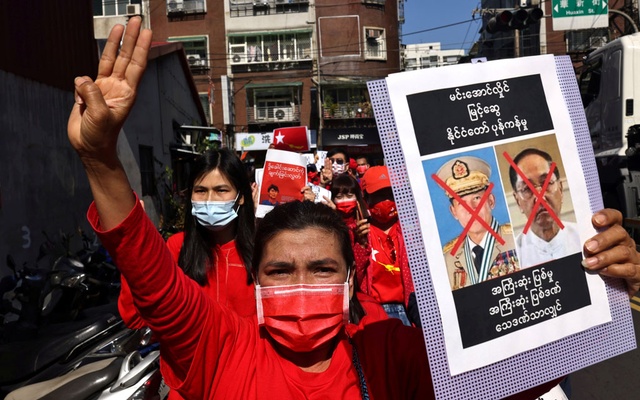
Reuters: Myanmar’s junta shut down the internet in the country on Saturday as thousands of people took to the streets of Yangon to denounce this week’s coup and demand the release of elected leader Aung San Suu Kyi.
In the first such demonstration since the generals seized power on Monday, activists in the country’s largest city chanted, “Military dictator, fail, fail; Democracy, win, win” and held banners reading “Against military dictatorship”. Bystanders offered them food and water.
Many in the crowd wore red, the colour of Suu Kyi’s National League for Democracy (NLD) which won Nov. 8 elections in a landslide, a result the generals have refused to recognise claiming fraud.
The protesters largely dispersed in the afternoon, but several hundred remained sitting on the road in a standoff with police, residents said. Another group of around 100 were blocked by police from reaching the main demonstration.
As the protest swelled and activists issued calls on social media for people to join the march, the country’s internet crashed.
Monitoring group NetBlocks Internet Observatory reported a “national-scale internet blackout”, saying on Twitter that connectivity had fallen to 54% of ordinary levels. Witnesses reported a shutdown of mobile data services and wifi.
The junta did not respond to requests for comment. It extended a social media crackdown to Twitter and Instagram after seeking to silence dissent by temporarily blocking Facebook, which counts half of the population as users.
Norwegian mobile network provider Telenor ASA said authorities had ordered all mobile operators to temporarily shut down the data network, although voice and SMS services remained open.
Many activists had sidestepped the Facebook ban by using virtual private networks to conceal their locations, but the more general internet disruption will severely limit their ability to organise and access independent news and information.
Myanmar civil society organisations appealed to internet providers and mobile networks to resist the junta’s orders, saying in joint statement they were “essentially legitimising the military’s authority”.
Telenor said it had stressed to the authorities that access to telecom services should be maintained. However it added it was bound by local law and its first priority was the safety of its local workers.
“We deeply regret the impact the shutdown has on the people in Myanmar,” it said in a statement.
Amnesty International’s deputy regional director for campaigns, Ming Yu Hah, said shutting down the internet amid a coup and the COVID-19 pandemic was a “heinous and reckless decision”.

